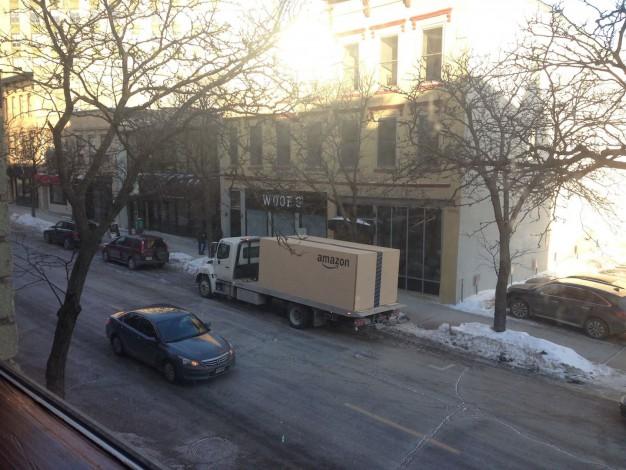In February, Cottage Grove’s plan commission voted unanimously to move forward with a proposal to construct an Amazon distribution facility in town. While the plans promise massive job creation and tax benefits, local residents remain upset over the lack of voice they have in the process.
Given its proximity to Cottage Grove, Sun Prairie and Madison, Amazon and developers must reevaluate how much they prioritize community-level input before proceeding.
The real issue is that resident concerns have not been respected or even addressed. Undoubtedly, when construction on this project begins, Amazon and its developers will need to secure support from local residents. If not, they’re signing up for decades of poor relations and resistance.
Most residents are not advocating to strike the plan down, but rather asking for a delay in the decision. If Amazon pays proper attention to these grievances — which seems unlikely — residents have demonstrated they would give their support to the project moving forward.
“We are being listened to, but not heard,” Dane County resident Jeff Christy said in a Channel 3000 article.
Christy’s house is within 600 feet of the lot in question, which is why he has followed the project so closely.
The warehouse property lies just outside the village boundaries, which is why Sun Prairie residents are not given as significant a say in the outcome. Therefore, residents are forced to rely on the ‘goodwill’ of the corporation to develop sustainably. This all begs the question — is this Amazon distribution center a positive or negative addition to Dane County?
The developers are promoting job creation as the primary benefit of construction. The completed facility will bring in a projected 1,500 jobs to the Cottage Grove area, though it is unclear how many of those will be commuters from various cities in Wisconsin.
This increased local employment could add a small boost to the Cottage Grove economy through higher consumer spending and infrastructure development.
But job guarantees are less powerful in an economy plagued by a worker shortage and high availability of employment opportunities. In February 2022, the Wisconsin unemployment rate dropped to 2.9%, according to a recent Department of Workforce Development estimate. Cottage Grove’s unemployment rate rests around 3.5%.
Others are more concerned with the warehouse’s environmental impact, including runoff and pollution. The most up-to-date facility proposal shows walls that will block any pollution or runoff to the nearby town, but of course, air and noise pollution are unavoidable trade-offs.
While housing prices may not be initially impacted by pollution or other physical environmental factors, one cannot discount the disturbances that come with corporate production. Traffic is also a large concern for residents since the facility will be in operation 24/7.
According to Trammell Crow developers, all truck traffic will be routed directly to and from I-94. For local residents who commute using this highway, this could present a congestion problem in the mornings or evenings amid shift changes in the warehouse.
There are therefore pros and cons that will be hard to understand until the project is finished. In fact, if developers were to address the concerns of local residents more attentively, this seems like an economically productive project that could also retain the community feel Cottage Grove residents want to preserve.
Though this project may not directly impact the University of Wisconsin, similar development projects affect students’ experiences on and around campus, specifically with housing. From environmental disruptions to property value fluctuation, the Madison housing climate is constantly changing.
Last year, we witnessed this first-hand with Core Spaces’ proposal for the Hub II. What’s more, State Street is an even more frightening example of how quickly local businesses can be toppled by large corporations.
Over the last 10+ years, high rent pricing in downtown Madison has resulted in an increase in business space turnover. From local boutiques converting into fast food chains, the changes are quite visible. Madison has been cherished as a haven for creativity and individuality, but with growing developments, this could change.
Cottage Grove resident requests are reasonable and rational. As such, it is in Amazon’s best interest to respond and react accordingly. It will be imperative, however, to measure the changes associated with the project should it move forward.
Cooperation and communication are key for the success of this project. Perhaps a third party, such as a local government or nonprofit representative, ought to step in to ensure both sides are happy with the plans for demolition and building.
Emma Axelrod (eaxelrod@wisc.edu) is a senior majoring in journalism and political science.


